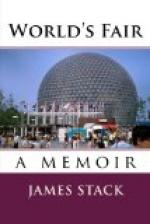The Turkish houses, above the ground floors, are usually built of thin laths, painted of different gay colours, and the roofs made of tiles, so that every few months a terrible fire takes place, and several thousand dwellings are burnt down; but the people are so accustomed to this that they do not mind it, and look on very contentedly while the fire rages, smoking their pipes, and drinking coffee.
The Turks are exceedingly charitable, and not only give alms to the sick and poor, but even to travellers and strangers; and some of them have exercised their benevolence so far that they have left a sum of money for digging wells, and for the support of several cats and dogs. A very great trade is carried on from many parts of the world with them, as their country is famous for its rich brocades, thick soft carpets, mattings, baskets, curiously-wrought gold and silver embroidery, and balsams. It is also remarkable for its attar of roses, spices, figs, and coffee; all very good things, I dare say, you will think.
[Illustration]
Some things have been sent from China to our Exhibition; but the Chinese people do not seem to care much about it. Indeed, I wonder they sent at all, for they consider themselves as the only civilized nation in the world, and call China the “Celestial Empire,” while they imagine that the Emperor is an intimate relation of the Sun, Moon, and Stars! They are a very industrious nation, however, and the Emperor encourages them by his example. The poor work in every way they can; and one of their occupations is carrying about water for sale, as they have not water brought by pipes into the houses, as we have here. Here is the picture of a Chinese water carrier.
[Illustration]
They also make the most elaborately carved ornaments, in wood and ivory; their toys and lanterns are celebrated for their ingenuity and workmanship. Their fireworks are superior to all those of other nations; and they excel in tricks and amusing entertainments. The cultivation of tea is universal, and agriculture—which, you know is the art of tilling the earth—is held in high esteem; the principal products being rice, wheat, yams, potatoes, turnips, and cabbages. The dwellings of the peasantry too, are not in villages, as in old England, but are scattered through the country; and they have no fences, gates, or anything to guard against wild beasts, or robbers. The females raise silk-worms, spin cotton, manufacture woollen stuffs, and are the only weavers in the empire. The art of printing, though done in what I must confess is rather a clumsy manner, is much exercised amongst them, and gives employment to many people.




